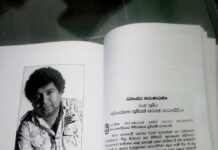[dropcap color=”green”]ප[/dropcap]සුගිය දිනක කළණ සේනාරත්න නමින් ලියන ලද ලිපියක අන්තර්ගතය වූයේ දයාන් ජයතිලකගේ බුද්ධි මහිමය පිළිබදවය. ඔහුට අනුව දයාන් ජයතිලක බුද්ධිමතෙකි. කෙනෙක් ඉංග්රීසියෙන් ලීවා කියා බුද්ධිමතෙකු වෙනවා නම් ඉංග්රීසි කතා කරන ලෝකයේ සිටින ඕනෑම හිඟන්නෙකු බුද්ධිමතෙකු විය යුතුය. දයාන් ජයතිලක විසින් දේශපාලනය අරබයා නිපද වූ අලුත් සංකල්ප තිබේද? එවැනි සංකල්ප ජාත්යන්තර විශ්ව විද්යාල පිළිගෙන තිබේද? අප දන්නා තරමින් නැත. එපමණක් නොව කළණ සේනාරත්න ගේ මහාපතරංග ජාතක වලට ද කිසිදු අරුතක් නැත. ඒවා cut & paste ලිපි ය.
Colombo Telegraph වෙබ් අඩවියට මිනිසුන් ගැන ප්රමිතියක් නැති බව එහි සිටින පුද්ගල විවිධත්වයෙන් ගම්ය වෙයි. මීනිමරුවන් ගේ සිට ලිබරල්වාදීන් දක්වා පුළුල් පරාසයක පුද්ගලයන් එහි ලියති. අපට අනුව නම් දයාන් ජයතිලක යනු බුද්ධිමතෙක් නොවේ. ඔහු දේශපාලන Opinion කාරයෙකි. ඔහුගේ අතීතය හාරා ඇවිස්සූ විට එන්නේ කුණු ගඳක් මිස තාර්කික රටාවක් නොවේ. ලංකාවේ සිටින කැතම අවස්ථාවාදියා දයාන් ජයතිලක ය. ස්ටැලින්වාදියෙකු ගේ තාර්කික රටාව කොපි කරන ඔහුට අනුව ඔහුගේ ගඳ ගැන කතා කිරීමත් සුවදවත්ය. ස්ත්රීන් විශාල ගණනකගේ ජීවිත විනාශ කළ මේ පුද්ගලයාට ප්රචාර ලබා දෙන්නේ ඔහු වැනිම තක්කඩීන්ය. මීට අමතරව තව දෙයක් ඉතා පැහැදිලිව කිව යුතුය. දයාන් ජයතිලක යනු සිංහල ජාතිවාදයේ වඩාත්ම අවස්ථාවාදී ප්රවණතාවය යි. සිවිල් යුද්ධය සහ යුද්ධය ( civil War & War) අතර වෙනස නොදන්නා, විමුක්ති අරගලයක් සහ ෆැසිස්ට්වාදය අතර වෙනස නොදන්නා, හිංසනයට නිශේධාත්මක පැවැත්මක්සේම නිර්මාණාත්මක පැවැත්මක් ද තිබේ යැයි නොදන්නා දයාන් ජයතිලක බුද්ධිමතෙක් ද?























“දයාන් ජයතිලක විසින් දේශපාලනය අරබයා නිපද වූ අලුත් සංකල්ප තිබේද? එවැනි සංකල්ප ජාත්යන්තර විශ්ව විද්යාල පිළිගෙන තිබේද?”
අනේ මොනවාද දීප්ති මේ කිච කතා? ජ්යාත්යන්තර විශ්වවිද්යාල වලින් පිළිගත්තොත් ඒ මිනිහා බුද්ධිමතෙක්ද? ඌ වටිනාවාද? මාක්ස්ගේ සදාකාලික වීරයා වෙච්ච ස්පාටකස්ව බුද්ධිමතෙක් කියලා විශ්ව විද්යාල කීයකින් පිලි අරන් තියනවාද? ඔයාට තාමත් දැනුම, බුද්ධිමතුන් ගැන පුදුමාකාර හීනමානයක් තියෙන්නේ. ඔයාට තාම මාක්ස්වාදය හරියට තේරෙන්නේ නැහැ කියන එක නැවත නැවත ඔප්පු කරනවා. ඔයාට ඒ කාලේ ඉඳල දයාන් ගැන තිබුනේ පුදුමාකාර හීනමානයක්. පස්සේ ඔයාගේ අතිජාත ගෝලයා වෙච්ච හැලපෙයටත් ඒක බෝ උනා. ඔයා ඒ කාලේ දයාන් බුද්ධිමතෙක් කියලා කියනකොට මට නම් ඒක මහා ප්රේහේලිකාවක්. මම දස අතේ කල්පනා කළා මේ යකාගේ ඇති වටිනාකම මොකක්ද කියලා. ඔය දයානයගේ තාත්ත මැරිච්චි දවසේ හැලාපයා කියනවා මම මර්වින් සිල්වාට ගරු කරන්නේ දයාන් ජයතිලක කියන පුතා හදපු නිසා කියලා. හැලපයා කියන්නෙත් ඒ අතින් බැලුවම පුදමාකර හීනමානයක් තියන එකෙක්. අපිට නම් දයාන් කියන්නේ කවදත් කුණු මාළු කෑල්ලක්. තුහ් නොදකින් බුද්ධිමත්තු……….
දීප්ති විසින් දේශපාලනය අරබයා නිපදවූ අලුත් සංකල්ප තිබේද? එවැනි සංකල්ප ජාත්යන්තර විශ්වවිද්යාල පිළිගෙන තිබේද?
Sampurna Aththa.
A LANKAN’S CONTRIBUTION TO THE DEBATE ON POLITICAL VIOLENCE & REVOLT
PROF NICK HEWLETT
[Prof Hewlett is at the Dept of French Studies, University of Warwick, UK. This article is excerpted from his essay ‘Marx, Engels, and the Ethics of Violence in Revolt’, in The
European Legacy: Toward New Paradigms, Routledge, 2012]
Recent events on the world stage have led to a renewed interest in the question of political violence. To take some of the most obvious examples, the wars in Iraq and Afghanistan, the ongoing conflict between Israel and Palestine, and the uprisings in North Africa and the Middle East, show that violence in countries and regions characterized by profound political upheaval is a highly topical issue. Wars, revolts and resistance will no doubt continue to be part of the foreseeable future, not least because of the continued shift of global economic and political power away from the United States and towards China and elsewhere, and the substantial shifts in geopolitical power these changes will bring with them. Amongst the many ethical issues raised by changes involving violence are those that apply to the violent overthrow of an existing regime, and/or more broadly an existing socioeconomic and political order. The ethical questions raised in such contexts include: Under what circumstances (if any) is violence justified? Who is justified in pursuing violence in revolt? If and when violence is legitimate, what are the limits to permissible violence? Do some radically different ends justify extreme violence? Does the nature of violent revolt affect the nature of the goal? Is pacifism or quasi-pacifism an appropriate means of effecting change in some (or all) circumstances? None of these questions is new, and responses to them are bound to be complex, but these are the sort of questions which will remain relevant for many years to come and will continue to require a framework for debate.
…In an important and concrete contribution to the debate on violence and revolt, [Dayan] Jayatilleka examines the ethics of violence of Fidel Castro. Via a detailed study of Castro’s writings, speeches and revolutionary practice, Jayatilleka suggests that the Cuban leader resolved the disagreement between Sartre and Camus regarding violence and morality; Sartre was critical of Camus’s disapproval of the violence of the oppressed. Whether, or to what extent, Jayatilleka is right in identifying Castro as the bearer of a correct moral stance on this question is less important for our purpose than what in effect becomes his (Jayatilleka’s) position on the ethics of violence, which is concerned with the actual practice of revolt. It might be argued that in light of the human rights record of the Cuban regime since the early 1960s, Castro cannot be held up as a moral arbiter of the ethics of violence in revolt. It might also be argued that any code of ethics that was adhered to during the 1958 revolution has been overshadowed by the abuse of human rights since the revolution. However, for the sake of highlighting Jayatilleka’s contribution we will bypass this debate.
Castro, writes Jayatilleka, is the ‘‘modernist, rational, internationalist; fighting
full-scale wars when necessary, but never resorting to targeting of non-combatants, physical torture and execution of captives’’. Castro’s main contribution to Marxism is the introduction of an ethical and moral dimension, which is ultimately based on Christianity. The moral superiority of the freedom fighter is ‘‘cultivated not by abstinence from violence as in the case of Gandhi, nor by the tactical use of violence as in the case of Mandela, but by conscious restraint in conduct, methods and targeting within the practice of armed rebellion, liberation war and revolution’’.
Jayatilleka then suggests three attitudes to violence: there are those who contend that
violence is always wrong, those who defend it if it is in pursuit of a just end, and those who argue that not only should the end be a worthy one but that the means of achieving this end must be subjected to ethical scrutiny. It is the latter attitude to violence that he considers the correct position and which according to him Castro embraces. More specifically, a bad use of violence is ‘‘terrorism targeting unarmed, non-combatant civilians; torture and arbitrary execution of prisoners; executions within the organization; and lethal violence against political prisoners’’. One of the merits of Jayatilleka’s work is precisely that it does not shy away from specifics. He argues convincingly that Sorel, Fanon, and Sartre did not go beyond:
“the understanding of the effect of dehumanization of the violence of the oppressor on the oppressed and the effect of humanization on the oppressed of the exercise of counter-violence, to an understanding of the effect of dehumanization of violence on the oppressed (which the Gandhians and other pacifists understood), when used by them without limits. There is no dialectical understanding of the violence of the oppressed, encompassing its contradictory aspects, both liberating and dehumanizing. This, however, was a concern of Camus, though his attempt to resolve the contradiction was unsatisfactory”.
Jayatilleka’s point is that Castro’s approach to violence is superior in that it combines morality and ethics into a discourse and practice of freedom fighting, in what becomes a synthesis of utopian-idealist socialism with both the scientific approach of Marxism and the praxis of Leninism. It is not necessary to endorse Castro’s views and practices, and certainly not in their entirety, in order to recognize in Jayatilleka’s argument a most welcome contribution that advances the debate on the relationship of classical Marxism and its legacy and the ethics of violence in revolt. At the very least, it defines a framework for discussion and offers highly concrete examples in an area where one is in danger of remaining either in the realm of abstractions or in the pragmatics of cases as they arise, without a middle way that offers an ethics based on both principle and practice.
Modern treatments of the ethics of violence in revolt fall into three broad categories. First, there are those who are best described as pacifist of quasi-pacifist, associated with Gandhi in particular, but also with certain feminist writers. The second group is that which, broadly speaking, seeks to justify violence when it is used to defend liberal democracy (which group, I suggest, includes Waltzer and to some extent Arendt). Finally, there is the group that attempts to justify violence when the ultimate ends of a violent campaign are viewed as just (i.e., the ‘‘just ends’’ approach, with which Sorel, Fanon, Marx and Engels are often associated).
My basic claim is that the exploration of the ethics of violence in revolt should combine the salient elements of all three approaches, particularly those of the first and the third approaches. My contention is that certain aspects of classical Marxism provide a useful framework within which to develop an ethics of violence in revolt of this kind, which is appropriate for the twenty-first century.
…I argue that in constructing a framework for the study of the ethics of violence in revolt we should look at concrete examples of revolt in order to temper the more idealized approach. The balance of these two elements is perhaps the greatest challenge for any ethics of violence, and is found in Jayatilleka’s fascinating examination of Castro’s thought and practice. His approach is an attempt to combine warm stream and cold stream theories of radical change, when applied to actual historical change, which is always more complex, and often harsher and more unpalatable, than debate in the abstract.
What I am arguing for is therefore both an interpretation and an augmentation of Marx and Engels that allows for an eclectic use of the work of thinkers who postdate them. Rather than interpreting the Marxist view of violence mainly as it is expressed in the Sorel-Lenin-Fanon/Sartre lineage, which often concentrates on justified violence as a form of self-defence, we should add and combine other, less obvious, influences. These might include not only the authors mentioned above but also, for example, the theory and practice of Gandhi and in particular his notion of nonviolent struggle through satyagraha. Another would be Martin Luther King and his practice of nonviolence, and also Malcolm X, who held that in the struggle for civil rights some violence was inevitable. This might seem impossibly eclectic, but only, I suggest, because new, even hybrid forms of thinking are urgently needed when it comes to the use of violence in revolt.
*******************************************
What is new?
In recent decades ,the discourse on the impossibility of the ‘new’ in political philosophy
Has become widespread and influential. Breaking out of the classical theory means becoming
Popular, alive and present outside the academia.
For example your theoretical discourse on violence based on epistemological horizon.
According
to that horizon , violence interprets around capital-nation- state and subject to subjective violence. But what about the objective
Violence of capital-nation-state system. Who cares about? According to our theoretical idea state violence is a deadlock
of a subjective violence. In that context our horizon is ontological in which violence is a matter of a material subject.
Because it is not related to any pregiven structural code.
Deepthi, had this not been published on 3mana, I would have thought it was written by Prof Nalin de Silva!
I enjoyed your post.
But by being unable to engage constructively with what I wrote in the above mentioned article (which was actually a book review), what becomes clear is how brilliantly one’s own ‘bankolothkama’ gets exposed. Don’t you think?
If this is the kind of post that passes off as a ‘buddhimath sanwadaya’, may the ‘this-thun-kotiyak devi devathavun’ help the sinhala readership!
Kalana Senaratne
When I said “Sampurna Aththa” , I am referring to DJ alias Dr Dayan. Yes he wrote about Castro and he lectured us about Latin American Revolution etc. But he is an opportunist. Thun Kotiyak Devi Devithavin should save Sinhala youth from characters like Dayan.
Excellent post, DJ is DJ it does not matter the time. he the opportunist by every perspective except for people who do not have a bit of common sense in them. however, common sense is not so common..!
මුන් වගේ එවුන්ව උස්සලා කථා කරන්ඩ පුලුවන් ඒ වගේම තක්කඩියන්ට තමා ඉතින්….
ඔය මාතෘකාව ගැන,දයාන් බුද්ධිමත්ද නැද්ද යන්න කියලා විමර්ශන වල යෙදෙන්න මට නං මොලයක් නෑ.හැබැයි අර “ඔපිනියන්” කතාව ඇත්ත.දයාන් ප්රේමදාසට ඔපිනියන් දිලා ප්රේමේ ඇන ගත්ත හැටි නං අපි දැක්කා.කොටින්ම මිනිහා අනුරුද්ධ තිලකසිරිත් වුනානේ.ඩෙන්සිල් කොබ්බෑකඩුවගේ මල ගේදා බොරැල්ල කනත්තේදි රෙදි නැතුව යන්න වුනේ හේතුව නිසාම දයාන් පසු කාලයේදි කොන්දේසි විරහිතවම මහින්ද සමඟ යුධ වාදි පෙරමුණු වෙනුවෙන පෙනි ඉඳියා.ඒ කාලයේ මරා ආණ්ඩුවේ “පච වාහිනි”වලට දයාන්ට වඩා මිනිහෙක් නොසිටියේය.සියල්ල අවසානයේ මහින්දට මාර බයිට එකක් හම්බ වුනේය.ඒ දයාන් ජයතිලක නම් වු “සෝ කෝල්”බුද්ධිමතාය.
Comments are closed.